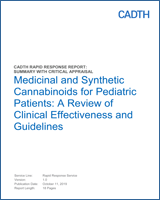 “Epilepsy is a chronic disease characterized by recurrent unprovoked seizures. Up to 30% of children with epilepsy will be refractory to standard anticonvulsant therapy, and those with epileptic encephalopathy can be particularly challenging to treat.
“Epilepsy is a chronic disease characterized by recurrent unprovoked seizures. Up to 30% of children with epilepsy will be refractory to standard anticonvulsant therapy, and those with epileptic encephalopathy can be particularly challenging to treat.
The endocannabinoid system can modulate the physiologic processes underlying epileptogenesis. The anticonvulsant properties of several cannabinoids, namely Δ-tetrahydrocannabinol and cannabidiol (CBD), have been demonstrated in both in vitro and in vivo studies.
Cannabis-based therapies have been used for millennia to treat a variety of diseases including epilepsy. Several studies have shown that CBD, both in isolation as a pharmaceutical-grade preparation or as part of a CBD-enriched cannabis herbal extract, is beneficial in decreasing seizure frequency in children with treatment-resistant epilepsy.
Overall, cannabis herbal extracts appear to provide greater efficacy in decreasing seizure frequency, but the studies assessing cannabis herbal extract are either retrospective or small-scale observational studies. The two large randomized controlled studies assessing the efficacy of pharmaceutical-grade CBD in children with Dravet and Lennox-Gastaut syndromes showed similar efficacy to other anticonvulsants. Lack of data regarding appropriate dosing and pediatric pharmacokinetics continues to make authorization of cannabis-based therapies to children with treatment-resistant epilepsy challenging.”
https://www.ncbi.nlm.nih.gov/pubmed/31895184
https://insights.ovid.com/crossref?an=00004691-202001000-00002


 “Palliative care is defined by the World Health Organization as “an approach that improves the quality of life of patients and their families facing the problem associated with life-threatening illness…”. The last days and hours of a person’s life can be associated with immense physical as well as emotional suffering Relief of pain and other distressing symptoms, and enhancement of quality of life, are among the essential elements of good palliative care. Palliative care could benefit an estimated 69% to 82% of dying individuals in Canada. As Canada’s population ages, with increasing prevalence of chronic conditions and treatments resulting in prolonged life, it is expected that there will be an increased need for palliative care services.
“Palliative care is defined by the World Health Organization as “an approach that improves the quality of life of patients and their families facing the problem associated with life-threatening illness…”. The last days and hours of a person’s life can be associated with immense physical as well as emotional suffering Relief of pain and other distressing symptoms, and enhancement of quality of life, are among the essential elements of good palliative care. Palliative care could benefit an estimated 69% to 82% of dying individuals in Canada. As Canada’s population ages, with increasing prevalence of chronic conditions and treatments resulting in prolonged life, it is expected that there will be an increased need for palliative care services. “Cannabinoids are pharmacologically active agents extracted from the cannabis plant.
“Cannabinoids are pharmacologically active agents extracted from the cannabis plant. 
 “To provide an up-to-date summary of the benefits and harms of
“To provide an up-to-date summary of the benefits and harms of  “Glioma-related epilepsy significantly impact on patients’ quality of life, and can often be difficult to treat. Seizures cause significant morbidity for example neurocognitive deterioration, which may result from seizures themselves or due to adverse effects from antiepileptic drugs. Management of tumour with surgery, radiotherapy and chemotherapy may contribute to seizure control, but tumour related epilepsy is often refractory despite adequate treatment with standard anti-epileptic medications. Given the increasing interest in medicinal cannabis (or
“Glioma-related epilepsy significantly impact on patients’ quality of life, and can often be difficult to treat. Seizures cause significant morbidity for example neurocognitive deterioration, which may result from seizures themselves or due to adverse effects from antiepileptic drugs. Management of tumour with surgery, radiotherapy and chemotherapy may contribute to seizure control, but tumour related epilepsy is often refractory despite adequate treatment with standard anti-epileptic medications. Given the increasing interest in medicinal cannabis (or  “This review focuses on the possible roles of phytocannabinoids, synthetic cannabinoids, endocannabinoids, and “transient receptor potential cation channel, subfamily V, member 1” (TRPV1) channel blockers in epilepsy treatment.
“This review focuses on the possible roles of phytocannabinoids, synthetic cannabinoids, endocannabinoids, and “transient receptor potential cation channel, subfamily V, member 1” (TRPV1) channel blockers in epilepsy treatment. “Heroin (diamorphine) is a highly addictive opioid drug synthesized from morphine. The use of heroin and incidence of heroin associated overdose death has increased sharply in the US.
“Heroin (diamorphine) is a highly addictive opioid drug synthesized from morphine. The use of heroin and incidence of heroin associated overdose death has increased sharply in the US.